A recent study from Michigan State University suggests that when it comes to teaching preschoolers how to read, simple is better. Despite the popularity of educational games and digital tools, learning to read is still most effective with hands-on activities, like writing letters and recognizing words in daily life.
The new findings, published in the Journal of Research in Reading, challenge the idea that some popular learning methods are as practical as parents might think. The study found that preschoolers who spent more time on literacy games scored lower on reading assessments. Meanwhile, those who engaged in print-focused activities showed the most significant progress.
The research identified three common types of literacy activities:
- Print-focused activities: Direct engagement with letters and words, such as writing names, pointing out words on signs, and practicing letter sounds.
- Shared book reading: Reading picture books together, visiting the library, or discussing stories.
- Literacy games: Playing with digital or physical games, including flashcards, apps, or alphabet videos.
The findings and their implications
The study’s findings were clear: print-focused activities consistently led to stronger early literacy skills in all children. Heavy use of literacy games was associated with worse literacy outcomes, regardless of a child’s background. This suggests that more exposure to learning tools doesn’t automatically lead to better results. Instead, it highlights the importance of intentional, hands-on teaching methods.
Lori Skibbe, a professor in the Department of Human Development and Family Studies at MSU, commented on the research: “This research shows that both content and mode of delivery are important when considering how to strengthen children’s early literacy skills. Focusing on print directly, via meaningful interactions with caregivers, was most helpful for children in our work. Literacy games and digital media cannot replace the role of caregivers in helping children to learn these skills. This is particularly important for children who have speech and/or language impairment, as they might need more time and opportunities to understand how print works.”
What parents should know about digital games
There are several reasons why some games may not be as helpful as they seem. Some games prioritize entertainment over education, using distracting visuals and sounds. Other games, even high-quality ones, may lack the personal, hands-on instruction that comes from activities like practicing writing or identifying words in the real world. This direct interaction is especially important for children with speech or language difficulties.
Teaching early reading skills doesn’t require expensive programs or tools. Everyday interactions that involve print are what matter most. Here are some simple tips for parents:
- Spot letters together: Find letters on street signs, food packaging, or menus.
- Make reading interactive: Point to words, talk about letter sounds, and ask questions while reading books.
- Encourage writing: Have your child write their name, draw letters, or label pictures.
Parents should be mindful about using digital learning tools, especially if their child is struggling. The study suggests that games should be used as a supplement to learning, not as the main method of instruction. This approach allows parents to actively engage with their children in the learning process.

Picture: Helping preschoolers with literacy (ChildUp.com)



